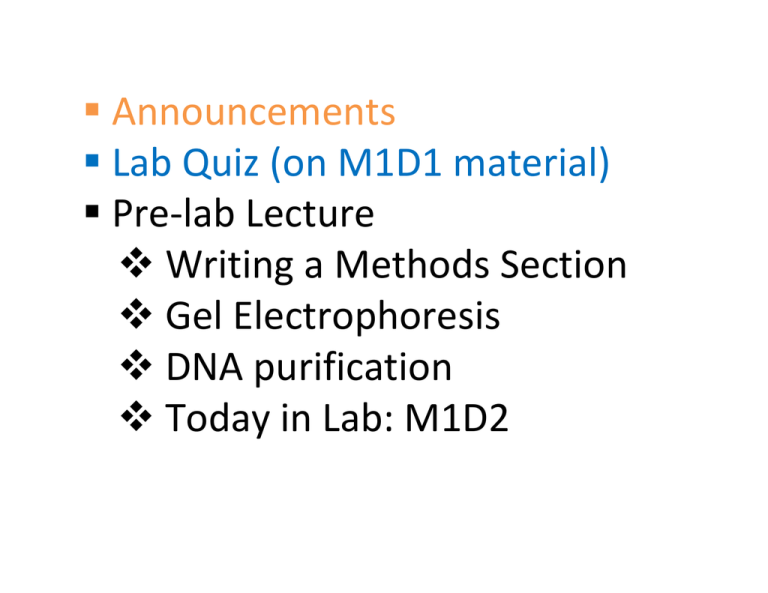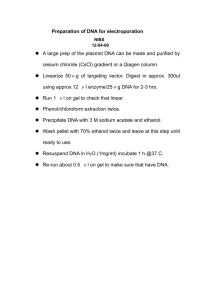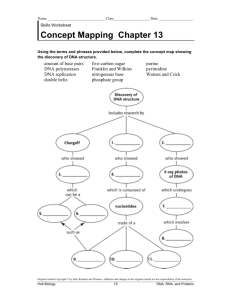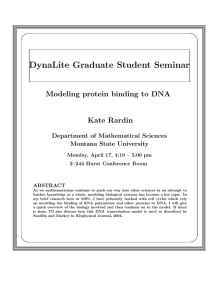Announcements Lab Quiz (on M1D1 material) Pre‐lab Lecture Writing a Methods Section
advertisement

Announcements Lab Quiz (on M1D1 material) Pre‐lab Lecture Writing a Methods Section Gel Electrophoresis DNA purification Today in Lab: M1D2 Announcements • Christina will be back by Day 4, is currently contributing from home • Discussion of orientation day quiz Methods section tips • Organizing sub‐sections – Start with an overview sentence, then detailed steps • Methods should be concise and complete – Space‐wise, avoid tables/lists if a sentence suffices – Sentence‐wise, avoid extra/confusing words – Content‐wise, cover what’s needed and only that which is needed to understand and replicate your experiments. • Concentrations are more useful than volumes; or you can state amounts, plus total volume. Methods section exercises • Which is more readable: “To the Y were added the X” or “The X were added to the Y”? • How can I more quickly express “1 g of protein in 45 mL of water and 5 mL of 10X buffer B”? – 2% protein in aqueous buffer B • Which parts of a PCR are unique to a given experiment, versus standard protocol? – Tanneal; textension (1min/kbp plasmid); # cycles; composition; concentration of template, primers DNA Electrophoresis (EP): Principle Agarose gel DNA Agarose and DNA are both Biological polymers Æ have molecular entanglements Driving force for separation: ‐ Electrostatic charge, mass ‐ + DNA moves to because of Phosphate groups Separation is according to: Size Shorter __________ DNA moves faster because Entanglements increase with size wt. % increases, pore size decreases + DNA EP: Visualization Loading dye: glycerol Æ sink into wells xylene cyanol Æ visual tracking dye Ethidium bromide: fluoresces under UV if bound to DNA DNA EP: Analysis L sample DNA ladder: standards of known size (and concentration) Relationship: 500bp if linear DNA, ~500bp DNA EP: Clean‐up and Safety • Use nitrile gloves when handling DNA gels and all equipment used for gels. • Gels and gel‐contaminated papers are disposed of in solid chemical waste. • Wear eye protection/face shields when cutting DNA bands out of a gel. DNA extraction from agarose gel why? isolated desired DNA, change buffer 1.bind DNA Æ high salt, low pH chaotropic salt disrupts H‐bond DNA sticks to silica column 2.keep DNA wash else ethanol – precipitates DNA Silica resin column [qiagen.com] 3.elute DNA Æ low salt, high pH Æ electrostatic repulsion –Si‐O‐ ‐O‐P‐DNA Note: initial mixture should look yellow, not blue Courtesy of QIAGEN GmbH. Used with permission. Today in Lab • Set up gel: runs 60 min, we will photograph it. – Mark your area of the gel box with coloured tape. – Bring your USB key up front. • Meanwhile, discussion w/Neal and Linda. • Finally, DNA extraction from gel. • FNT: methods section, read journal article. MIT OpenCourseWare http://ocw.mit.edu 20.109 Laboratory Fundamentals in Biological Engineering Spring 2010 For information about citing these materials or our Terms of Use, visit: http://ocw.mit.edu/terms.




